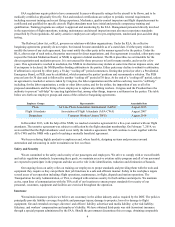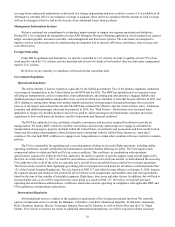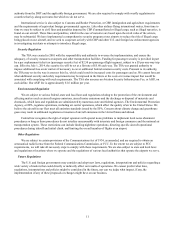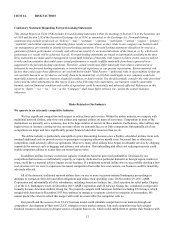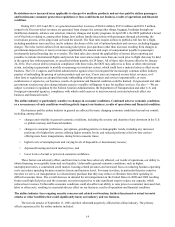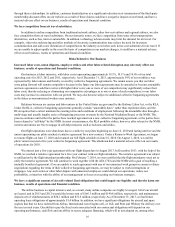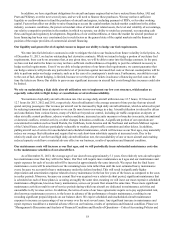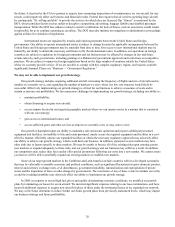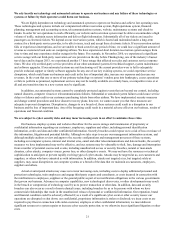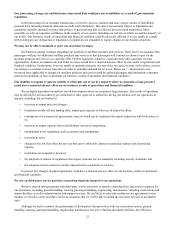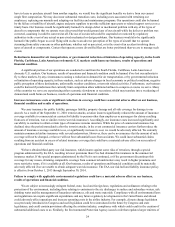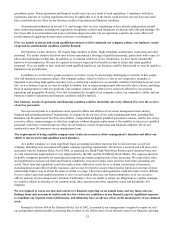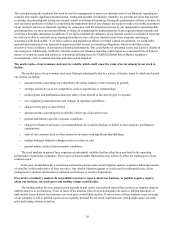Spirit Airlines 2013 Annual Report Download - page 19
Download and view the complete annual report
Please find page 19 of the 2013 Spirit Airlines annual report below. You can navigate through the pages in the report by either clicking on the pages listed below, or by using the keyword search tool below to find specific information within the annual report.19
Estimates—Aircraft Maintenance, Materials and Repair Costs and Heavy Maintenance Amortization” and “—Maintenance
Reserves.”
Our lack of marketing alliances could harm our business.
Many airlines, including the domestic traditional network airlines (American, Delta and United) have marketing alliances
with other airlines, under which they market and advertise their status as marketing alliance partners. These alliances, such as
OneWorld, SkyTeam and Star Alliance, generally provide for code-sharing, frequent flier program reciprocity, coordinated
scheduling of flights to permit convenient connections and other joint marketing activities. Such arrangements permit an airline
to market flights operated by other alliance members as its own. This increases the destinations, connections and frequencies
offered by the airline and provides an opportunity to increase traffic on that airline’s segment of flights connecting with alliance
partners. We currently do not have any alliances with U.S. or foreign airlines. Our lack of marketing alliances puts us at a
competitive disadvantage to traditional network carriers who are able to attract passengers through more widespread alliances,
particularly on international routes, and that disadvantage may result in a material adverse effect on our passenger traffic,
business, results of operations and financial condition.
We are subject to extensive and increasing regulation by the Federal Aviation Administration, the Department of
Transportation and other U.S. and foreign governmental agencies, compliance with which could cause us to incur
increased costs and adversely affect our business and financial results.
Airlines are subject to extensive and increasing regulatory and legal compliance requirements, both domestically and
internationally, that involve significant costs. In the last several years, Congress has passed laws, and the DOT, FAA and TSA
have issued regulations, relating to the operation of airlines that have required significant expenditures. We expect to continue
to incur expenses in connection with complying with government regulations. Additional laws, regulations, taxes and increased
airport rates and charges have been proposed from time to time that could significantly increase the cost of airline operations or
reduce the demand for air travel. If adopted, these measures could have the effect of raising ticket prices, reducing revenue and
increasing costs. For example, the DOT finalized rules in April 2010 requiring new procedures for customer handling during
long onboard tarmac delays, as well as additional reporting requirements for airlines that could increase the cost of airline
operations or reduce revenues. The DOT has been aggressively investigating alleged violations of these rules. A second set of
DOT final rules, which became effective in August 2011 and January 2012, addresses, among other things, concerns about how
airlines handle interactions with passengers through advertising, the reservations process, at the airport and on board the
aircraft, including requirements for disclosure of base fares plus a set of regulatorily dictated options and limits on cancellations
and service charges for changes and cancellations. Additional consumer and disabled passenger rules may be proposed in 2014.
In addition, the FAA recently issued its final regulations governing pilot rest periods and work hours for all airlines certificated
under Part 121 of the Federal Aviation Regulations. The rule known as FAR 117 and which became effective January 4, 2014,
impacts the required amount and timing of rest periods for pilots between work assignments and modifies duty and rest
requirements based on the time of day, number of scheduled segments, flight types, time zones and other factors. Compliance
with these rules may increase our costs, while failure to remain in full compliance with these rules may subject us to fines or
other enforcement action.
We cannot assure you that compliance with these rules will not have a material adverse effect on our business.
In August 2010, the Airline Baggage Transparency and Accountability Act was introduced in the United States Senate.
This legislation, if enacted, would increase disclosure regarding fees for airline ticket sales, impose federal taxes on charges for
carry-on and checked baggage, authorize the DOT's Aviation Consumer Protection Division to oversee lost and stolen baggage
claims, and require data collection and the public release of collected data concerning airline handling of lost, damaged and
stolen luggage. In early 2011, the United States Senate passed an amendment to the FAA reauthorization bill that, if enacted,
would impose federal taxes at a rate of 7.5% on charges for carry-on baggage. If the Airline Baggage Transparency and
Accountability Act, the Senate amendment to the FAA reauthorization bill or similar legislation were to be enacted, it is
uncertain what effect it would have on our results of operations and financial condition.
We cannot assure you that these and other laws or regulations enacted in the future will not harm our business. In
addition, the TSA mandates the federalization of certain airport security procedures and imposes additional security
requirements on airports and airlines, most of which are funded by a per ticket tax on passengers and a tax on airlines. In July
2014, the TSA will implement an increased passenger security fee at a flat rate of $5.60. The ticket tax increase could
negatively impact our financial results.
Our ability to operate as an airline is dependent on our maintaining certifications issued to us by the DOT and the
FAA. The FAA has the authority to issue mandatory orders relating to, among other things, the grounding of aircraft, inspection
of aircraft, installation of new safety-related items and removal and replacement of aircraft parts that have failed or may fail in


